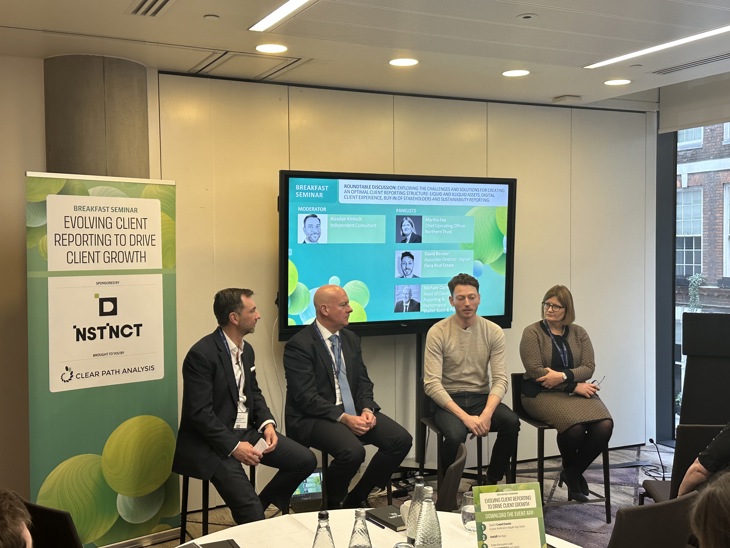
A lively panel debate on how client reporting in the investment sector can be developed to drive growth saw senior leaders cautioning that the industry should not underestimate the importance of the client experience.
The panel, which took place in London this past week, explored the challenges and solutions around creating an optimal client reporting structure – covering topics such as liquid and illiquid assets, the digital client experience, sustainability reporting, and stakeholder buy-in. It featured Michael Clarke, Head of Client Reporting and Performance at Walter Scott & Partners, David Bender, Associate Director of Digital at Fiera Real Estate UK, and Martha Fee, Chief Operating Officer (COO) at Northern Trust.
The ongoing boom in – and necessity of – digital operations for investment professionals was a prescient topic. “Finance in particular has been a challenge largely due to the complexity of the data,” said Bender. Moving forward, it will be critical to an organisation’s longevity and success that it reaches a steady stage of digital operations, he added.
Clarke said that his firm was seeing an emphasis on internal demand, but was focused on ensuring that when clients asked for information, it was available. “We’re seeing a demand in areas like due diligence and sustainability.”
“Client-based abilities will ramp up very quickly. It’s imperative we get
upstream of [our data] now.”
Bender noted that his organisation hadn’t yet seen a huge amount of client demand. However, this trend was all the more concerning because it was indicative of a larger difficulty: that client demand doesn’t typically develop at a steady, visible pace. “Our clients might not yet have the [digital] capabilities to be self-served in ways we are prepared to serve them,” he said. “But these client-based abilities will ramp up very quickly.”
Bender’s solution to this inconsistent development was to plan in advance and anticipate well into the future. “It’s imperative we organise our data now and get upstream of it so we can be ready for this [client] demand when it does hit.”
Fee said that a complicating factor was keeping your client base in mind – because demand can vary depending on client makeup. “Our clients tend to be institutional asset owners,” she said. “We live in a platform-based economy now, so we need to be ready for this increasing hunger [for digital reporting] at a larger scale – even if it isn’t completely apparent at the moment.”
Because data demands are constantly changing, investors will likely need to be increasingly dynamic and agile as they deploy capital and report on these strategies.
Fee was quick to point out that client demand wasn’t the only influencing factor; many digital reporting transformations were driven by regulatory changes.
“Reporting regimes in Europe [SFDR, SDR, TNFD] are the gift that
keeps on giving.”
“Reporting regimes in Europe [SFDR, SDR, TNFD] are the gift that keeps on giving,” she said. “We’ve seen the ESG phenomenon across the globe – the E in Europe and Asia, and the S in North America – and you need to embed this focus throughout the entire DNA of your organisation.”
Fee emphasised the significance of considering sustainability data points before the reporting process even begins, noting that investors cannot report on information they do not have. “If it’s not there in the investment process, it can’t be there in the reporting process,” she said. “This is key to consider when servicing client needs.”
“If it’s not there in the investment process, it can’t be there in
the reporting process.”
One buzzword that kept resurfacing was ‘interoperability’ – or the ability of digital systems to seamlessly exchange, share, and make use of information – specifically as relates to sustainability reporting.
In October 2022, the International Finance Reporting Standards (IFRS) Foundation’s International Sustainability Standards Board (ISSB) released a paper that detailed the steps required to establish a global baseline for sustainability reporting, highlighting the “importance of achieving greater interoperability with jurisdictional requirements.”
In recent discussions, interoperability of systems and software has been seen as the foundational building block of client reporting, sustainability reporting – and the future of digital investment, more broadly. “The externalisation of this [interoperability] for clients is a product,” said Alasdair Kinloch, the panel’s moderator and a private consultant.
Bender was particularly outspoken on the topic of understanding data and its uses – from all angles of an investment business.
“Data itself isn’t the problem. We need to ask: why are
we collecting it?”
He said that the challenge was less about capturing the right data, and more about conceptualising the bigger picture: the who, what, where, when, and why. “Data itself isn’t the problem. We need to go upstream and ask: why are we collecting it? Who is involved in making it? What is the process it goes through?”
Bender added that because there are endless amounts of data and constant regulatory shifts, ESG can either be a hindrance or an opportunity for investors. Understanding the culture of an organisation – especially how it handles failure – can also help with stakeholder buy-in.
When it comes to galvanising senior management, Fee said that identifying strategic priorities is important, as is clear and consistent communication. Having – and properly articulating – the investment and business case to support these efforts makes all the difference. “You need buy-in across all teams and silos; you need the ‘why’ to move the dial.”